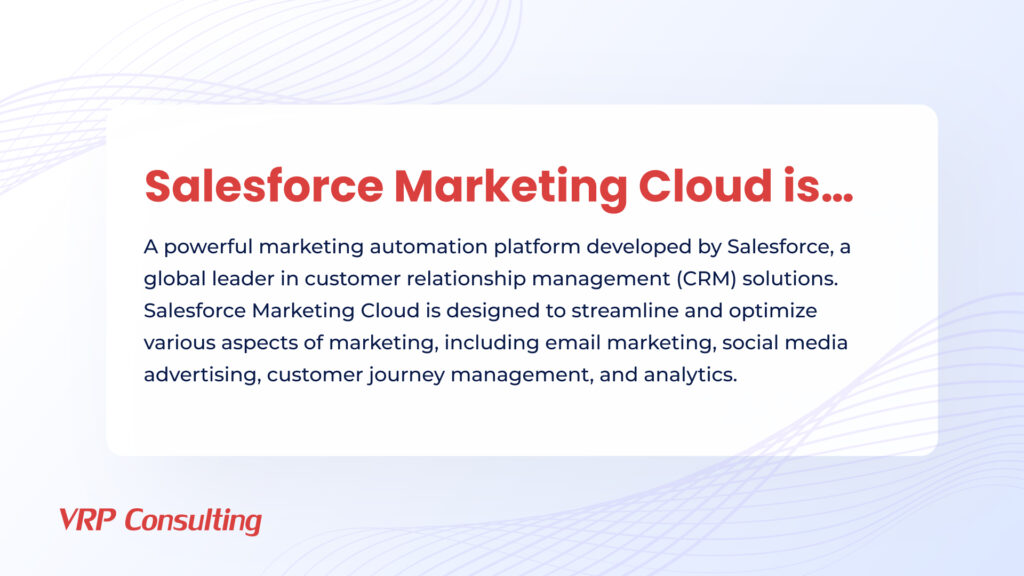What’s the one digital transformation question to ask that can make the difference between a successful transformation program and one that fails to drive success? Read this article to find out.
Are you interested in implementing Salesforce® Marketing Cloud for your business or nonprofit organization? Still unsure what it offers or what sets it apart from competing solutions? You’ve come to the right place! In this article, I’ll be exploring the top 10 Salesforce Marketing Cloud features and the difference they can make for you. Read on!
Need a general introduction to Marketing Cloud?

Unsure exactly what Salesforce Marketing Cloud is? Want a broad overview of this powerful product? You may also want to read another article provided by VRP Consulting, “What is Salesforce Marketing Cloud?”.
“What is Salesforce Marketing Cloud?” looks at a range of useful topics, including what Salesforce Marketing Cloud is, a definition of marketing automation, what Marketing Cloud is used for, and lots more. So, if you think you need to start at the very beginning, we can help with that, too – check out our previous article at the link above.
If you already have a basic familiarity with Marketing Cloud, then let’s move forward and delve deeper into the key features of Salesforce Marketing Cloud:
Our picks from the Salesforce Marketing Cloud features list
In this article, I’ve chosen 10 of the Salesforce marketing cloud features I believe will be the most valuable to the majority of organizations. They aren’t listed in any particular order, simply because each unique business or nonprofit will have its own differing priorities and needs.
However, I will be providing examples of each feature helping a particular kind of organization, just to illustrate. These aren’t exhaustive – just snapshots of individual use cases for specific industries/organizations. There are many other possible use cases for each of these features, which can apply to all kinds of other common situations and types of organizations – including yours!
Let’s get started:
1. Customer-centric marketing

At the heart of Salesforce Marketing Cloud is the concept of customer-centric marketing. Unlike traditional marketing approaches that rely on mass messaging and one-size-fits-all campaigns, Marketing Cloud enables organizations to put the customer at the center of their marketing efforts. With the help of data-driven insights and advanced analytics, marketers can gain a deeper understanding of their customers’ preferences, behaviors, and needs, allowing them to deliver highly personalized experiences across all digital channels.
Example: A retail company uses Salesforce Marketing Cloud to send personalized product recommendations to customers based on their past purchase history and browsing behavior. By tailoring the content of their marketing emails to each individual customer’s preferences, the company sees a significant increase in click-through rates and conversions.
2. Streamlined workflows and automation

One of the key Salesforce Marketing Cloud features is its ability to streamline marketing workflows and automate repetitive tasks. With features like Journey Builder and Automation Studio, marketers can design and execute complex, multi-channel campaigns with ease, saving time and resources while ensuring consistent messaging and brand experiences. By automating routine processes, marketers can focus their efforts on strategic initiatives that drive results and innovation.
Example: An eCommerce business utilizes Journey Builder in Salesforce Marketing Cloud to create an automated email campaign that targets customers who have abandoned their shopping carts. The business sets up triggers to send personalized follow-up emails to these customers, reminding them of their abandoned items and offering exclusive discounts to encourage them to complete their purchase.
3. Robust analytics and reporting

Another of the standout features of Marketing Cloud is its robust suite of analytics and reporting tools. From real-time dashboards to advanced predictive analytics, Marketing Cloud provides marketers with the insights they need to measure the impact of their campaigns, identify trends and opportunities, and make data-driven decisions. Thanks to new, actionable insights, marketers can continuously optimize their marketing strategies for maximum effectiveness and ROI.
Example: A software company tracks the performance of its marketing campaigns using the analytics dashboard in Salesforce Marketing Cloud. By analyzing key metrics such as open rates, click-through rates, and conversion rates, the company identifies which campaigns are most effective in driving customer engagement and sales. Armed with these insights, the company adjusts its marketing strategies accordingly to maximize ROI.
4. Seamless integration with the Salesforce ecosystem

One factor that sets Marketing Cloud apart from its competitors is its seamless integration with the broader Salesforce ecosystem. As part of the Salesforce Customer 360 platform, Marketing Cloud seamlessly integrates with Salesforce CRM and other Salesforce products, enabling organizations to gain a unified view of their customers across sales, service, marketing, and more. This integrated approach allows marketers to create cohesive, omni-channel experiences that drive engagement and loyalty throughout the customer journey.
Example: A healthcare organization harnesses the seamless integration between Salesforce Marketing Cloud and Salesforce CRM to create personalized patient engagement campaigns. By accessing patient data stored in Salesforce CRM, the organization delivers targeted health education materials and appointment reminders to patients via email and SMS, leading to improved patient satisfaction and health outcomes.
5. AI-powered personalization

Marketing Cloud’s AI-powered personalization capabilities also differentiate it from the competition. With features like Personalization Builder and Einstein AI, marketers can deliver hyper-targeted content, recommendations, and offers to each individual customer, driving engagement and conversions. Using AI and machine learning, marketers can anticipate customer needs, personalize interactions in real-time, and deliver relevant messaging that resonates with customers on a personal level.
Example: An online travel agency uses Personalization Builder in Salesforce Marketing Cloud to deliver personalized travel recommendations to its customers. By analyzing customers’ past booking history, travel preferences, and browsing behavior, the agency dynamically customizes its website content and email offers to each individual customer, resulting in higher booking rates and customer satisfaction.
6. Multi-channel campaign management

Salesforce Marketing Cloud offers robust multi-channel campaign management capabilities, allowing marketers to create and deploy campaigns across a variety of channels, including email, mobile, social media, and more. With integrated tools for audience segmentation, content creation, and campaign tracking, marketers can easily orchestrate coordinated campaigns that reach customers wherever they are. By delivering consistent messaging across multiple touchpoints, organizations can maximize their reach and engagement while driving conversions and revenue.
Example: A nonprofit organization launches a multi-channel fundraising campaign to support its mission of providing clean water to communities in need. Using Salesforce Marketing Cloud, the organization creates coordinated campaigns across email, social media, and SMS channels, sharing compelling stories and impact updates with supporters. By reaching donors on multiple platforms and engaging them with personalized messages, the nonprofit drives increased donations and support for its cause.
7. Dynamic content personalization

Dynamic content personalization is a key benefit of Salesforce Marketing Cloud. It enables marketers to deliver highly relevant and personalized content to their customers at scale. With dynamic content blocks and rules-based targeting, marketers can dynamically customize email, web, and mobile content based on each customer’s preferences, behavior, and interactions. By delivering content that resonates with individual customers, organizations can increase engagement, drive conversions, and build stronger relationships with their audience.
Example: A humanitarian aid organization sends out a monthly newsletter to its supporters using Salesforce Marketing Cloud. With dynamic content personalization, the organization dynamically customizes the newsletter content based on each donor’s interests, previous donation history, and engagement level. Donors receive personalized updates on the specific projects and initiatives they have supported, along with stories of impact and opportunities to get involved. As a result, donors feel more connected to the organization’s work and are inspired to continue supporting its mission.
8. Marketing automation

Marketing automation is a cornerstone Marketing Cloud feature. Marketers are empowered to automate repetitive tasks and workflows, freeing up time to focus on strategic initiatives and creative endeavors. With automation capabilities for email sends, lead nurturing, campaign scheduling, and more, marketers can streamline their operations and deliver timely, relevant messaging to their audience. By automating routine processes, organizations can improve efficiency, scale their marketing efforts, and drive better results.
Example: A B2B technology company automates its lead nurturing process using Salesforce Marketing Cloud. With marketing automation, the company sets up a series of automated email workflows to nurture leads at each stage of the buyer’s journey, from awareness to consideration to decision. By delivering targeted content and offers to leads based on their behavior and interests, the company accelerates the sales cycle and drives more qualified leads.
9. Near real-time segmented messages

Salesforce Marketing Cloud allows organizations to send marketing communications, via channels like email and SMS, almost instantly. So, if a business wants to provide near real-time updates about changes to its services, or new time-sensitive promotions, Marketing Cloud enables them to do this. The content can also be segmented according to customers’ locations, preferences they have submitted, and other important factors. Using a dedicated preference center, accessible via a mobile app or mobile/desktop web browser, customers can set detailed requirements for the kinds of communications they do or do not wish to receive, subscribing and unsubscribing to communications exactly as they wish.
Example: A transportation company enables its customers to subscribe to email and SMS communications about their chosen routes/services and relevant promotions. Customers receive weekly round-up messages detailing planned service closures (for instance, due to engineering works), as well as near real-time messages regarding unplanned outages that are relevant to them, whenever outages occur. They can even choose to pause messages during user-defined periods, for instance when they are on vacation. All this useful functionality increases customer satisfaction and engagement with the brand.

10. Amplified advertising reach
Finally, Salesforce Marketing Cloud empowers organizations to extend their reach and engage with audiences across digital advertising platforms such as Google Ads, Facebook Ads, and more. By leveraging the capabilities of Advertising Studio, organizations can create, manage, and optimize targeted advertising campaigns directly within Salesforce Marketing Cloud, streamlining their marketing efforts and driving better results. From audience segmentation and targeting to ad creation and optimization, Advertising Studio provides marketers with the resources they need to reach the right audience with the right message at the right time.
Example: A nonprofit organization focused on environmental conservation uses Advertising Studio to raise awareness and drive support for its cause. The organization creates targeted ads on Facebook to promote its upcoming fundraising event, highlighting the impact of its work and inviting supporters to donate. By leveraging data from Salesforce CRM, the organization targets its ads to users who have previously engaged with its content or expressed interest in environmental causes. As a result, the organization sees increased attendance at its event and a higher level of donations, helping to further its mission of protecting the planet.
Want to make the most of these Salesforce Marketing Cloud features?
I hope this article has been useful to you, and answered some key questions you may have about Marketing Cloud features and their value to you.
Once again, the examples I’ve given here are by no means the only instances where Salesforce Marketing Cloud can help. There are all kinds of other situations in which Marketing Cloud can provide real value for businesses and nonprofits across the board. As a leading global Salesforce consultancy with a dedicated Marketing Cloud Practice, VRP Consulting helps organizations around the world to unlock all the power and value of Salesforce Marketing Cloud – and we want to help you, too.
So, if you think your organization could benefit from implementing Marketing Cloud, or you would like to explore some relevant use cases for your work, we would love to speak to you. Please feel free to get in touch with us, and we’ll be happy to answer any questions and tell you all the valuable things Salesforce Marketing Cloud can do for you.

